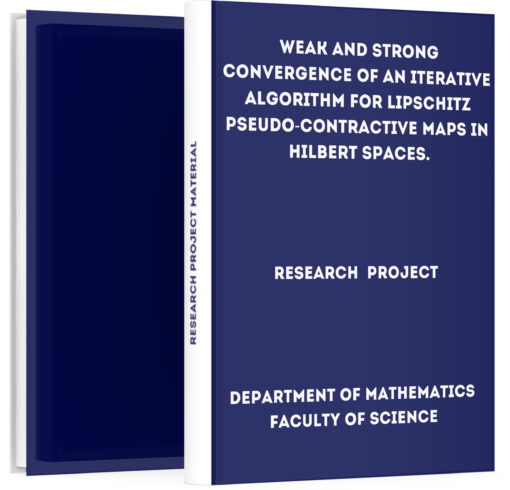Weak and Strong Convergence of an Iterative Algorithm for Lipschitz Pseudo-Contractive Maps in Hilbert Spaces
₦3,000.00
If you are interested in getting this project material “Weak and Strong Convergence of an Iterative Algorithm for Lipschitz Pseudo-Contractive Maps in Hilbert Spaces”, click on the DOWNLOAD BUTTON to make payment and the file will be delivered to your email immediately after confirmation.
Description
– Weak and Strong Convergence of an Iterative Algorithm for Lipschitz Pseudo-Contractive Maps in Hilbert Spaces –
Download Weak and Strong Convergence of an Iterative Algorithm for Lipschitz Pseudo-Contractive Maps in Hilbert Spaces. Students who are writing their projects can get this material to aid their research work.
Abstract
Let H be a real Hilbert space and K a nonempty, closed convex subset of H.Let T : K → K be Lipschitz pseudo-contractive map with a nonempty fixed points set.
We introduce a modified Ishikawa iterative algorithm for Lipschitz pseudo-contractive maps and prove that our new iterative algorithm converges strongly to a fixed point of T in real Hilbert space.
Introduction
1.1 Background of the Study
The contribution of this thesis falls under a branch of mathematics called Functional Analysis.
Functional Analysis as an independent mathematical discipline started at the turn of the 19th century and was finally established in 1920’s and 1930’s, on one hand under the influence of the study of specific classes of linear operators-integral operators.
Integral equations connected with them-and on the other hand under the influence of the purely intrinsic development of modern mathematics with its desire to generalize and thus to clarify the true nature of some regular behaviour.
Quantum Mechanics also had a great influence on the development of Functional Analysis, since its basic concepts, for example energy, turned out to be linear operators on infinite dimensional spaces.
In the early stages of the development of Functional Analysis the problems studied were those that could be stated and solved in terms of linear operators on elements of the space alone.
But as the concept of a space was being developed and deepened, the concept of a function was being developed and generalized. In the end, it became necessary to consider mapping (not necessary linear) from one space into another.
How to Download this Project Material
First, note that we are one of the best and most reliable online platforms because we don’t retain any of your personal information or data as regards making payments online.
PRICE: ₦3,500 ₦3,000 (Three Thousand Naira Only)
Make a bank deposit or mobile transfer of ₦2,000 only to the account given below;
Bank Name: UBA Account Number: 1022564031 Account Name: TMLT PRO SERVICES
After making the payment, CLICK HERE to send the following on WhatsApp;
- Depositor’s Name or Screenshot of Payment
- Name of the Past Question
- Active Email Address
or Call Us On +2348082284439 Once your details have been received and your payment confirmed by us, you will receive the past question in your email or WhatsApp within 5 Minutes.
Guarantee of Getting the Material
We understand that due to the high rate of fraud, many people are afraid of making purchases online but be rest assured that PastExamQuestions will deliver your material after payment.
Once your details have been received and your payment confirmed by us, you will receive the past question in your email or WhatsApp.
Give us Feedback
Have we been able to satisfy you? How well do you think the material will be helpful after having gone through it? Does the price worth the material?
Let’s hear from you! We recommend that our customers give feedback at the end of every transaction to enable us to serve better. You can do this by clicking the review button on this page.
Where is the review button? >> Just scroll up to where you see reviews





Reviews
There are no reviews yet.